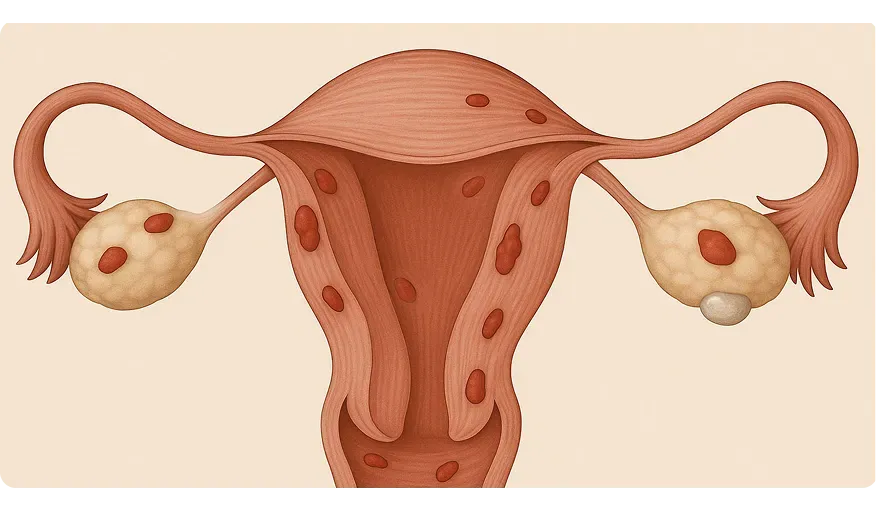Treatments
Endometriosis Treatment Options
Compassionate, Personalized Solutions for Long-Term Relief and Fertility Support
Dr. Lucas Minig – Minimally Invasive Surgery Expert Care for women with deep & severe pelvic endometriosis
Request Consultation or Second Opinion

You Deserve Relief—And a Plan That Works for You
Endometriosis is complex, but so are you.
That’s why we don’t treat symptoms in isolation. We treat the whole woman—with personalized care plans based on your age, your pain, and your hopes for the future.
Our treatment philosophy is simple: reduce pain, preserve fertility, and improve quality of life—all while minimizing invasiveness whenever possible.
DOWNLOAD A FREE Roadmap
FREE Endometriosis Symptom & Diary Kit
Keep track of your daily symptoms, pain levels, and treatment responses with our expert-designed PDF. This tool helps both you and your care team identify patterns and optimize your plan.
Three Core Approaches to Managing Endometriosis
Depending on the severity of symptoms and your reproductive goals, treatment may include:
Oral Pain Relievers & Anti-Inflammatories
For mild cases, we begin with over-the-counter analgesics (ibuprofen, paracetamol, dexketoprofen) to manage pain and inflammation. These medications offer fast, accessible symptom relief—especially when pain is predictable and cycle-related.
Hormonal Therapies
Hormonal treatments can significantly reduce endometriosis-related pain by suppressing ovulation and menstrual flow.
- Oral contraceptives (especially those with Dienogest) taken continuously to stop periods.
- Vaginal rings or hormonal IUDs to deliver localized relief.
- GnRH agonists/antagonists used for short-term hormone suppression to slow disease progression.
Important: Hormonal treatments can ease symptoms but do not eliminate endometriotic tissue. That’s where surgery may come in.
Surgical Treatment
In cases where symptoms persist or fertility is affected, we offer advanced minimally invasive surgery. Our goal: remove disease while preserving healthy organs and your ability to conceive.

Types of Endometriosis Surgery
All surgical procedures are performed laparoscopically by Dr. Lucas Minig, a global leader in complex gynecologic surgery. Procedures are performed under general anesthesia and the duration varies according with the type of surgery that may include:
- Cystectomy (removal of ovarian endometriomas)
- Excision of deep endometriotic implants (e.g. bladder, rectum, ureter)
- Lysis of pelvic adhesions to restore organ mobility
- Nerve dissection to target chronic pelvic pain
- Hysterectomy (only in severe, refractory cases after childbearing)
- Bowel/bladder resections (in highly selected cases)
Each procedure is carefully mapped to minimize trauma and protect fertility wherever possible.
Patients from around the world trust our expertise to treat even the most complex cases that local providers may not manage.
Planning for Fertility During and After Treatment
Whether you’re actively trying to conceive or planning ahead, our treatment strategy will reflect your goals.
- We avoid unnecessary removal of ovaries.
- We offer fertility-sparing surgery.
- Post-surgical care includes reproductive planning, hormone optimization, and IVF support when needed.
What to Expect After Surgery
Days 0-1
Urinate by yourself. Walking. Hospital dishcarge by Dr Minig in-person
Days 1-15
Progressive home recovery; virtual follow-up. Day 10 - 15: travel to your city/country
Weeks 2–4
Normal activities resume according with level of pain; discomfort fades.Back to work. virtual follow-up.
Months 1–3
Back to full rutine, including work and excercises. virtual follow-up...
Ongoing
Annual ultrasounds help monitor for recurrence
Recovery from endometriosis surgery varies, but most patients return home within 1–2 days.
We stay with you through every phase—before, during, and long after surgery.
“I always felt heard. Dr. Minig didn’t just treat my pain—he treated me like a partner in my care.”
— Ingrid, Ireland
Why Choose Dr. Minig for Fertility-Sparing Cancer Care?
More than a clinic — we are your international partner in healing.
With over 20 years experience treating global patients, we offer personalized surgical care and full logistical support for those traveling to Valencia.
- Specialized Expertise: Specialist in advanced gynecologic surgery
- Minimally Invasive Excellence: Over 95% of our surgeries utilize laparoscopic or robotic techniques.
- Individualized Care: We align treatment with your pain tolerance, fertility desires, and lifestyle.
- Whole-Woman Approach: From surgery to nutrition and emotional well-being, we support every facet of your health.
- Industry-Leading Research & Innovation
- Global Reach: Personalized logistical support for international patients
“The care I received was outstanding. I flew to Valencia for treatment and it was the best decision I made for my health.”
— Noemí G.

International patient welcome
Whether you’re in Europe, North America, or beyond, our clinic offers:
Tele-Consultations in English, Spanish and Italian
Concierge Travel Assistance for visas, lodging, and local transportation
Flexible Scheduling to accommodate your time zone
Frequently asked questions
Can endometriosis be cured?
There is currently no definitive cure for endometriosis, but it can be effectively managed. Many women experience significant and long-lasting relief through a combination of hormonal therapies, surgery, and lifestyle adjustments. In some cases, symptoms naturally decrease with menopause. The key is personalized treatment tailored to your symptoms, goals, and stage of life.
Do hormonal treatments stop endometriosis from progressing?
Hormonal treatments—such as birth control pills, IUDs with progestin, or GnRH analogues—help suppress symptoms by reducing estrogen levels, which fuel endometrial-like tissue growth. While they don’t eliminate existing lesions, they can slow progression, reduce inflammation, and lessen pain. They’re often used as a first-line approach or after surgery to help prevent recurrence.
Can I still get pregnant with endometriosis?
Yes—many women with endometriosis can and do conceive, either naturally or with medical assistance. Treatment can significantly improve fertility, especially when surgical excision removes adhesions or restores function to the ovaries, fallopian tubes, or uterus. If you’re planning for children, we’ll design a strategy that protects and supports your reproductive goals.
Ready for Relief? Let’s talk.
Whether you want our symptom kit, the patient guide, or to speak directly with Dr. Minig, we’re here for you.
